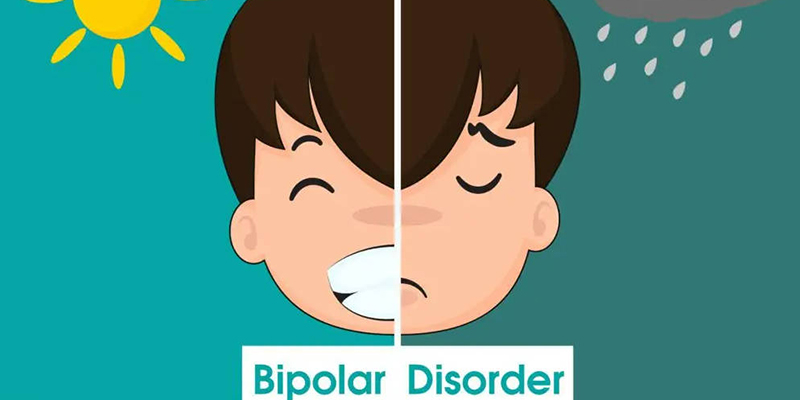What Are The Signs And Symptoms Of Bipolar Disorder?
Bipolar disorder is a complex mental health condition defined by significant mood swings that oscillate between emotional highs (mania or hypomania) and lows (depression). Recognizing the signs and symptoms is essential not only for those who may be experiencing bipolar disorder but also for their families and friends.
Bipolar disorder is a complex mental health condition defined by significant mood swings that oscillate between emotional highs (mania or hypomania) and lows (depression). Recognizing the signs and symptoms is essential not only for those who may be experiencing bipolar disorder but also for their families and friends.

Understanding these fluctuations can illustrate the importance of early intervention, which can lead to effective management and emotional support. Raising awareness about bipolar disorder also aids in decreasing the stigma surrounding mental health issues, promoting a more compassionate society. Whether you're searching for information for personal reasons or a loved one, grasping the essentials of bipolar disorder is crucial to fostering understanding and aiding recovery.
Types Of Bipolar Disorder
Bipolar disorder is defined as a mental health condition that is marked by distinct mood swings, ranging from manic episodes to depressive ones. It can be classified into three primary types:
1. Bipolar I Disorder: This condition is characterized by manic episodes lasting at least seven days or by manic symptoms so severe that immediate hospitalization is required. Depressive episodes typically occur and can last for at least two weeks.
2. Bipolar II Disorder: This form includes a pattern of depressive episodes and at least one hypomanic episode, a milder form of mania. Importantly, individuals with this disorder do not experience the full-blown manic episodes typical of Bipolar I.
3. Cyclothymic Disorder (Cyclothymia): In this classification, individuals experience hypomanic and depressive symptoms for at least two years (one year in children and adolescents), but these symptoms do not fulfil the full criteria for a hypomanic or depressive episode.
Recent statistics suggest that bipolar disorder affects about 2.8% of adults in the United States, with globally comparable rates, highlighting that this condition is prevalent yet frequently miscomprehended. Understanding these different types can enable individuals to identify symptoms in themselves or others, facilitating the pursuit of appropriate support and care.
The Mood Episodes Of Bipolar Disorder
1. Manic Episodes
Manic episodes are marked by a highly elevated mood and an intense surge of energy, often coupled with increased impulsivity. During these periods, individuals may feel euphoric, leading to exuberant behaviours that can disrupt their daily lives. For instance, a person in a manic state may take on numerous ambitious projects or make significant financial decisions without proper forethought, such as overspending on unnecessary items. For example, a business professional might decide to revamp entire work processes overnight, which could create conflict with colleagues who struggle to keep pace. Moreover, these episodes can adversely affect personal relationships, as loved ones may feel overwhelmed or neglected by the individual's unyielding energy and ambitions. Sadly, the impulsivity inherent in mania can lead to damaging consequences, creating rifts in relationships that matter the most when the manic state subsides.
2. Depressive Episodes
In stark contrast, depressive episodes present a pervasive low mood, robbing individuals of joy even in activities they once cherished. Symptoms may include profound fatigue, a diminished interest in previous hobbies, and persistent hopelessness. For example, someone who once thrived on social engagements may feel too drained to leave home, resulting in missed gatherings and alienation from friends and family. These depressive states can have a pronounced impact on work life, too, with individuals frequently unable to meet deadlines or concentrate on tasks, which can escalate Stress and amplify feelings of inadequacy. The emotional weight of these episodes is hefty, as those impacted may grapple with self-image issues, feeling isolated even when surrounded by supportive family and friends. It is, therefore, crucial to identify these depression-related signs as indicative of bipolar disorder to access the help needed for recovery and improved quality of life.

Mixed Episodes
Mixed episodes represent a unique dimension within bipolar disorder, where symptoms of both mania and depression coexist. Individuals experiencing mixed episodes may feel an unsettling combination of high energy and restlessness alongside feelings of sadness or despair. This dissonance can be expressed in various ways; for instance, someone might possess racing thoughts typical of manic episodes while simultaneously exhibiting symptoms such as prolonged sleepiness linked to depression. Diagnosing mixed episodes presents considerable challenges; the conflicting symptoms can confuse individuals and healthcare professionals. Treatment approaches that traditionally focus on managing mania or depression independently may be insufficient. Instead, mixed episodes necessitate a more sophisticated treatment strategy that considers the unique interplay of both mood states. Consequently, collaboration with mental health professionals becomes essential, as they can formulate a tailored plan that accurately targets this complex condition, ultimately leading to more effective care.
Recognizing The Symptoms: A Deeper Look
1. Emotional Symptoms
Bipolar disorder markedly affects emotional well-being and is characterized by significant swings between emotional highs and lows. During manic episodes, individuals may experience elevated mood, heightened energy, and inflated self-esteem, which could lead to drastic and impulsive behaviour that jeopardizes their lives. For instance, a person might abruptly embark on a new business enterprise without assessing the potential risks. Conversely, during dips into depression, the individual may be overwhelmed by feelings of despair, hopelessness, and worthlessness. This stark contrast influences self-image and motivation levels. One may struggle to rise from bed or engage with loved ones, which could also create tension in relationships. These emotional fluctuations aren't merely mood swings; they can evolve into debilitating experiences that disrupt daily functioning and interpersonal dynamics.
2. Cognitive Symptoms
Cognitive symptoms of bipolar disorder can profoundly influence an individual's thought processes and ability to make decisions. During the manic phase, a person may experience racing thoughts, leading to difficulty concentrating or following through with tasks. For example, while brainstorming for a project, they might oscillate from idea to idea without completing any, culminating in frustration and inefficacy. Conversely, during depressive phases, cognitive difficulties can manifest as indecisiveness and lack of focus, making even minor decisions feel overwhelmingly complex. An individual may find it challenging to think clearly or make firm choices, prompting self-doubt and further exacerbating feelings of inadequacy. These cognitive disturbances not only impair personal efficiency but can also lead to misunderstandings with others, highlighting the daily hurdles faced by those contending with bipolar disorder.
When To Seek Help
Recognizing the signs indicating that you or a loved one may require professional assistance. Be aware of persistent mood fluctuations, modifications in sleep habits, or decreasing functionality in daily life. If depressive episodes extend for several weeks or manic episodes result in impulsive decisions, these may signal an urgent need for evaluation. Timely action is vital; reach out to a mental health professional, like a psychologist or psychiatrist, for an assessment. Help is available, and taking the initial step could significantly improve one's quality of life. Never hesitate to seek support when it is needed the most.
Embracing The Journey Toward Recovery
Recognizing the signs and symptoms of bipolar disorder is vital for early intervention and effective management. A firm understanding of this multifaceted condition can pave the way for support and treatment, empowering those affected to lead fulfilling lives. If you or someone you know is grappling with this disorder, understand that you are not alone—help is accessible. Do not hesitate to contact friends, family, or mental health professionals for guidance and assistance. Approaching the path to wellness with hope and determination can usher in the first steps toward overcoming the challenges posed by bipolar disorder.







